人教版英语九年级Unit 2主题阅读
“基于单元话题的主题拓展阅读教学模式”的构建与实施
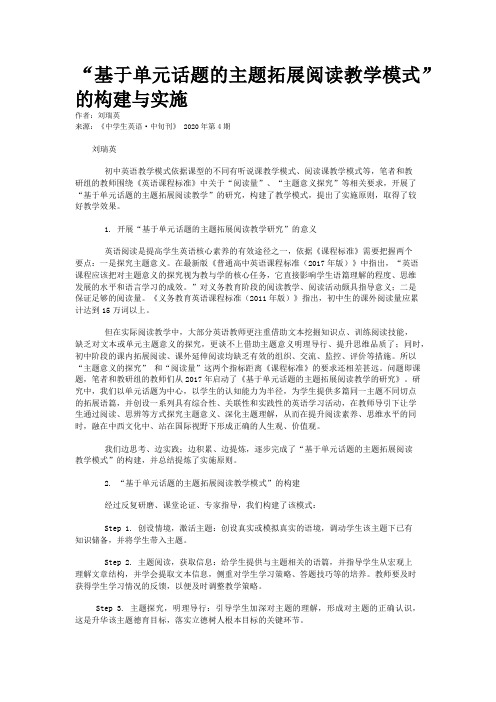
“基于单元话题的主题拓展阅读教学模式”的构建与实施作者:刘瑞英来源:《中学生英语·中旬刊》 2020年第4期刘瑞英初中英语教学模式依据课型的不同有听说课教学模式、阅读课教学模式等,笔者和教研组的教师围绕《英语课程标准》中关于“阅读量”、“主题意义探究”等相关要求,开展了“基于单元话题的主题拓展阅读教学”的研究,构建了教学模式,提出了实施原则,取得了较好教学效果。
1. 开展“基于单元话题的主题拓展阅读教学研究”的意义英语阅读是提高学生英语核心素养的有效途径之一,依据《课程标准》需要把握两个要点:一是探究主题意义。
在最新版《普通高中英语课程标准(2017年版)》中指出,“英语课程应该把对主题意义的探究视为教与学的核心任务,它直接影响学生语篇理解的程度、思维发展的水平和语言学习的成效。
”对义务教育阶段的阅读教学、阅读活动颇具指导意义;二是保证足够的阅读量。
《义务教育英语课程标准(2011年版)》指出,初中生的课外阅读量应累计达到15万词以上。
但在实际阅读教学中,大部分英语教师更注重借助文本挖掘知识点、训练阅读技能,缺乏对文本或单元主题意义的探究,更谈不上借助主题意义明理导行、提升思维品质了;同时,初中阶段的课内拓展阅读、课外延伸阅读均缺乏有效的组织、交流、监控、评价等措施。
所以“主题意义的探究” 和“阅读量”这两个指标距离《课程标准》的要求还相差甚远。
问题即课题,笔者和教研组的教师们从2017年启动了《基于单元话题的主题拓展阅读教学的研究》。
研究中,我们以单元话题为中心,以学生的认知能力为半径,为学生提供多篇同一主题不同切点的拓展语篇,并创设一系列具有综合性、关联性和实践性的英语学习活动,在教师导引下让学生通过阅读、思辨等方式探究主题意义、深化主题理解,从而在提升阅读素养、思维水平的同时,融在中西文化中、站在国际视野下形成正确的人生观、价值观。
我们边思考、边实践;边积累、边提炼,逐步完成了“基于单元话题的主题拓展阅读教学模式”的构建,并总结提炼了实施原则。
Module8SportslifeUnit2教案九年级英语上册
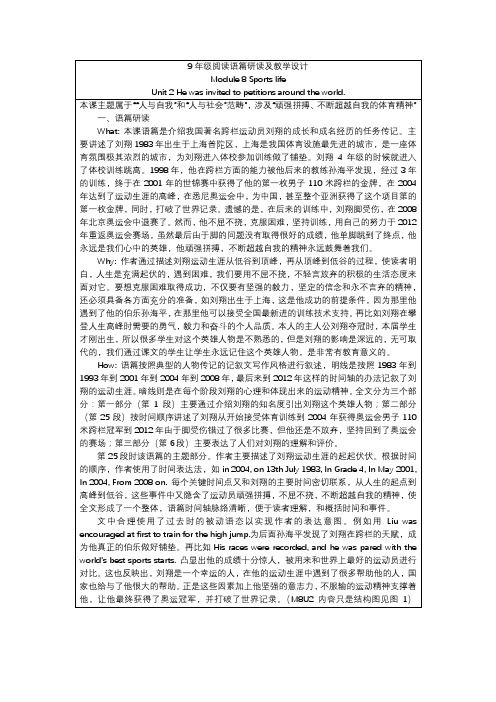
4. 分析刘翔的高峰和低谷,分析观众对刘翔后期表现的不同的看法,深化刘翔在亚洲乃至世界的重大意义。
5. 小组合作展示介绍自己最喜欢的一名运动员,并为制作我最喜欢运动员的vlog写好字幕稿(迁移创新)
7. 学生仔细阅读文章,根据文章给出的时间轴,进行事件的推断。先自己阅读归纳,后组内交流,了解刘翔的人生轨迹。
8. 学生思考:对于刘翔来说哪一年是重要的?学生在老师的引导下,分析,推断刘翔成功背后的原因,有客观原因也有主观原因。
9. 学生借助黑板上的的山因:不仅要有天赋,还要遇到伯乐,有国家和亲朋好友的支持,最重要的是要有坚定的信念,坚强的毅力,顽强拼搏的精神。
5. 小组合作展示介绍自己最喜欢的一名运动员,并为制作我最喜欢运动员的vlog写好字幕稿(迁移创新)
11. 观看亚运会精彩视频,引出 话题:你最喜欢的运动员是谁?
12. 学生基于情镜,以小组为单位,抽取需要介绍的运动员资料,小组合作,运用本节课学习到的篇章结构和时间轴记事法完成我最喜欢运动员的介绍短文,最后在同学们们面前进行展示。
文中合理使用了过去时的被动语态以实现作者的表达意图。例如用Liu was encouraged at first to train for the high jump.为后面孙海平发现了刘翔在跨栏的天赋,成为他真正的伯乐做好铺垫。再比如His races were recorded, and he was pared with the world’s best sports starts. 凸显出他的成绩十分惊人,被用来和世界上最好的运动员进行对比。这也反映出,刘翔是一个幸运的人,在他的运动生涯中遇到了很多帮助他的人,国家也给与了他很大的帮助。正是这些因素加上他坚强的意志力,不服输的运动精神支撑着他,让他最终获得了奥运冠军,并打破了世界记录。(M8U2内容只是结构图见图1)
人教九年级Unit2SectionA阅读课FullMoon,FullFeelings教学设计

一、教学目标
(一)知识与技能
本节课是关于人教版九年级英语Unit 2 Section A的阅读课,主题为“Full Moon, Full Feelings”。通过本节课的学习,学生应掌握以下知识与技能:
1.掌握本节课的核心词汇和短语,如:reunion, tradition, express, celebrate等,并能熟练运用到日常交流中。
-目的:通过观看视频,提高学生的听力理解能力,同时拓宽他们的国际视野。
4.家庭任务:与家人一起准备一次中秋节的家庭聚会,尝试用英文介绍中秋节的相关习俗,并将这个过程记录下来,以文字或图片形式展示给同学。
-目的:将所学知识运用到实际生活中,增强学生的跨文化交际能力,同时增进家庭感情。
5.阅读拓展:阅读一本与中秋节相关的英文书籍或文章,了解更多的文化背景知识,提高阅读水平。
2.理解并掌握一般现在时的用法,尤其是在描述传统文化和习俗时。
3.能够理解并运用阅读策略,如预测、扫描、略读等,快速获取文章主要信息。
4.能够通过阅读文章,了解中秋节的相关文化背景,提高跨文化交际能力。
(二)过程与方法
在本节课的教学过程中,学生将通过以下方法提高英语阅读能力:
1.预测:在学习文章之前,引导学生根据标题和图片预测文章内容,激发学生的阅读兴趣。
-教师布置练习:“Now, please write a short passage about your favorite traditional festival using the vocabulary and grammar we learned today.”
2.学生互相批改,教师进行点评和指导,给予鼓励和建议。
初中英语上册(主题阅读 综合能力)专项训练二Unit2Colour(含答案)
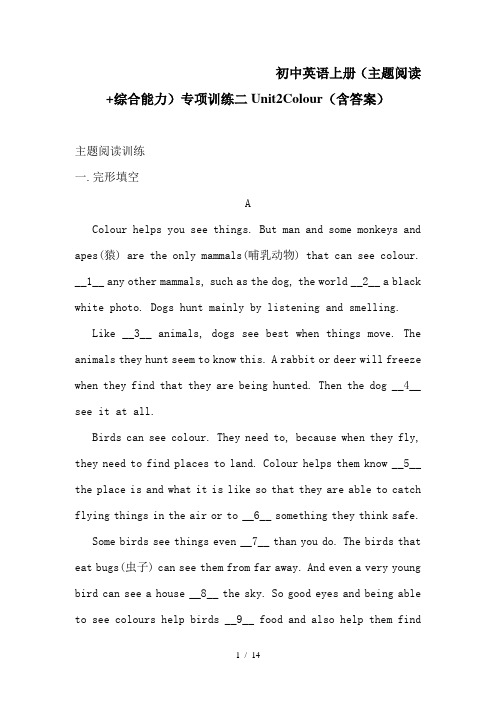
初中英语上册(主题阅读+综合能力)专项训练二Unit2Colour(含答案)主题阅读训练一.完形填空AColour helps you see things. But man and some monkeys and apes(猿) are the only mammals(哺乳动物) that can see colour. __1__ any other mammals, such as the dog, the world __2__ a black white photo. Dogs hunt mainly by listening and smelling.Like __3__ animals, dogs see best when things move. The animals they hunt seem to know this. A rabbit or deer will freeze when they find that they are being hunted. Then the dog __4__ see it at all.Birds can see colour. They need to, because when they fly, they need to find places to land. Colour helps them know __5__ the place is and what it is like so that they are able to catch flying things in the air or to __6__ something they think safe.Some birds see things even __7__ than you do. The birds that eat bugs(虫子) can see them from far away. And even a very young bird can see a house __8__ the sky. So good eyes and being able to see colours help birds __9__ food and also help them find__10__their enemies are.( )1. A. For B. With C. As D. To ( )2. A. seem like B. looks like C. likes D. like( )3. A. other B. the other C. another D. others( )4. A. may not B. should not C. must not D. need not( )5. A. how soon B. how long C. how fast D. how far( )6. A. land B. land on C. land for D. be landed( )7. A. worse B. nearer C. better D. less( )8. A. for B. inC. on D. at( )9. A. to look at B. look at C. find D. found( )10. A. whereB. when C. if D. thatBWe live in a colourful world. In different countries, colours have __1__ meanings. They are used to __2__ different holidays. In ancient Rome, a red flag was a __3__ for battle(战。
人教版九年级英语各单元主题思维导图(1-10)
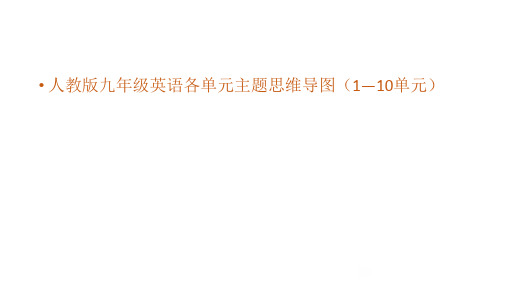
Learning how to learn
单元整体话题篇
Structures
A: Do you learn English by reading aloud? B: Yes, I do. It helps with my pronunciation A: How can I improve my pronunciation? B: Well, one way is by listening to tapes.
阅读篇-Section B 2b
The Spirit of Christmas
Sharing and giving love and joy
The Best Example: A Christmas Carol (a novel by Charles Dickens)
three ghosts 1. the Ghost of... Past 2. the Ghost of... Present 3. the Ghost of... Yet to Come
Keep practicing what they have learnt
Be not afraid of making mistakes By writing down key words or by drawing mind maps
By reading notes every day or by explaining the information to another student
by working with friends /a group by writing e-mails to pen pals take notes by writing down key words or by drawing mind maps Maybe you should join an English club. Don't read word for word. Read word groups. Be patient. It takes time. Practice makes perfect.
人教版英语九年级全册Unit2单元教学设计

(二)过程与方法
1.采用任务型教学法,引导学生通过小组合作、讨论、调查等方式,探究环保问题,提高解决问题的能力。
2.利用多媒体课堂参与度。
3.设计丰富多样的课堂活动,如角色扮演、小组辩论、头脑风暴等,培养学生的创新思维和批判性思维。
-口语交流中,如何流畅使用所学句型和词汇,进行有深度的对话。
(二)教学设想
1.教学策略:
-采用情景教学法,通过图片、视频等直观教具,让学生在真实语境中感知和学习环保词汇和句型。
-利用任务驱动法,设计小组合作任务,让学生在完成具体任务的过程中,自然习得语言知识。
-实施差异化教学,针对不同学生的学习需求和能力水平,提供个性化的学习材料和指导。
3.强调环保的重要性,激发学生课后参与环保活动的热情。
4.布置课后作业,要求学生运用所学知识完成相关练习,为下一节课的学习做好准备。
五、作业布置
为了巩固本单元的学习成果,培养学生的自主学习能力,特布置以下作业:
1.词汇练习:要求学生复习本单元所学的环保主题词汇,并运用这些词汇完成课后练习册的相关练习。此外,鼓励学生通过查阅词典、网络资源等,自主扩展更多环保词汇,为课堂讨论和写作积累素材。
-组织学生进行环保主题的研究性学习,提高学生的探究能力和批判性思维能力。
四、教学内容与过程
(一)导入新课
在导入环节,我将采用以下方法激发学生的兴趣和好奇心,为学习新课做好准备:
1.展示地球生态环境的图片,让学生观察并思考:“What do you see in these pictures? How do you feel about them?”通过这种方式,让学生意识到环保问题的紧迫性。
九年级英语人教版全一册_Unit2_单元主题思维导图

Unit2 I think that mooncakes are delicious!
单元主题思维导图
Jacob Marley
In the past, 1. mean 2. not treat others nicely 3. just care about making more money, hate Christmas
单元整体话题篇
At home and abroad
Spring Festival Dragon Boat Festival Lantern Festival Mid-Autumn Festival Water Festival(in Thailand) Thai New Year Mother's Day Fathers Day Christmas Easter Halloween
fantastic, fun(to watch), not that interesting( to watch traditional, special famous, popular, pretty, beautiful, delicious
Descriptive words
Festivals
I know/believe that... I wonder if/whether… What fun the Water Festival is! How pretty the dragon boats were!
Structures
Cultural lexicon Festivals
单元整体话题篇ChaΒιβλιοθήκη actersScrooge
At present, 1. celebrate Christmas with his give gifts to people in need 2. treat... with kindness and warmth 3. spread love and joy
人教版初三英语全册写作训练 Unit 2
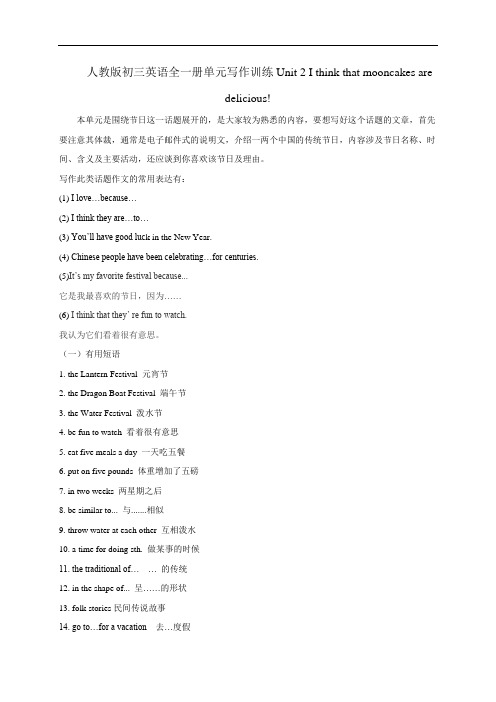
人教版初三英语全一册单元写作训练Unit 2 I think that mooncakes aredelicious!本单元是围绕节日这一话题展开的,是大家较为熟悉的内容,要想写好这个话题的文章,首先要注意其体裁,通常是电子邮件式的说明文,介绍一两个中国的传统节日,内容涉及节日名称、时间、含义及主要活动,还应谈到你喜欢该节日及理由。
写作此类话题作文的常用表达有:(1) I love…because…(2) I think they are…to…(3) You’ll have good luc k in the New Year.(4) Chinese people have been celebrating…for centuries.(5)It’s my favorite festival because...它是我最喜欢的节日,因为……(6)I think that they’ re fun to watch.我认为它们看着很有意思。
(一)有用短语1. the Lantern Festival 元宵节2. the Dragon Boat Festival 端午节3. the Water Festival 泼水节4. be fun to watch 看着很有意思5. eat five meals a day 一天吃五餐6. put on five pounds 体重增加了五磅7. in two weeks 两星期之后8. be similar to... 与.......相似9. throw water at each other 互相泼水10. a time for doing sth. 做某事的时候11. the traditional of… … 的传统12. in the shape of... 呈……的形状13. folk stories民间传说故事14. go to…for a vacation 去…度假15. wash away 冲走;洗掉16. lay out摆开;布置17. end up最终成为;最后处于18. share sth. with sb. 与……分享……19. as a result结果20. one,. . the other... (两者中的)一个……另一个……21. take sb. out for dinner 带某人出去吃饭22. dress up 乔装打扮23. haunted house 鬼屋24. trick or treat (万圣节用语)不给糖果就捣蛋25. fly up to… 飞向…26. take sb. around…带某人到处走走27. play a trick on sb.捉弄某人28. give out 分发29. the importance of…. …..的重要性30. care about….. 关心31. call out 大声呼喊32. remind sb. of 使某人想起33. sound like 听起来像34. treat sb. with. 用/以……对待某人35. the beginning of new life 新生命的开始36. the spirit of.. . ….的精神37.on October the 31st 在10月31日38.how touching 多么动人39.have good luck in the new year在新的一年里有好运气40. in need 需要帮助;处于困境中41. not only…but also…不但…而且…42. between…and… 在…和…之间【典型例题】假如你是李磊,你的美国笔友Tom对中国传统文化很感兴趣。
- 1、下载文档前请自行甄别文档内容的完整性,平台不提供额外的编辑、内容补充、找答案等附加服务。
- 2、"仅部分预览"的文档,不可在线预览部分如存在完整性等问题,可反馈申请退款(可完整预览的文档不适用该条件!)。
- 3、如文档侵犯您的权益,请联系客服反馈,我们会尽快为您处理(人工客服工作时间:9:00-18:30)。
Unit 2主题阅读一、完形填空Once there was a clever man. One cay he went shopping and he found a very beautiful vase. He loved it very much. It was 400 dollars. But it was too ____1____ for him.“Could you sell it at 200 dollars?” He wanted to cut down the _____2_____.“I’m sorry I can’t,” the shop assistant answered.Then he ____3____ the shop without saying any words. He went back home and ___4___ his friends about the vase. His friends worked out a ____5_____. The clever man hoped the plan could work.The next day, one of his friends went to ____6____ and asked for the vase at 350 dollars. The shop assistant didn’t ____7_____.Shortly after first one, the second friend went there and asked for it at 300 dollars. ___8____ shook his head.Later, the third for 200. The second for 150. The fifth for 100. Oh! It was too ___9____.At last, the clever man went to the shop and offered 100 dollars again. This time, the plan worked and he ____10____ the beautiful vase at his price.1. A. useful B. expensive C. cheap2. A. tree B. shop assistant C. price3. A. left B. went C. saw4. A. gave B. answered C. told5. A. poem B. plan C. rule6. A. the shop B. his home C. another shop7. A. reply B. agree C. appear8. A. The clever man B. One of his friends C. The shop assistant9. A. high B. expensive C. low10.A. broke B. sold C. got二、阅读理解ASeptember Friday and Sunday Voice of Music 14:00; 16:00Lord of the Rings(II)The Two Towers14:00; 16:20; 20:00; 22:00Monday toThursdayThe Lion King, Shrek (II) 12:00; 14:00;16:00; 20:00Superman(III) 14:00; 16:00; 20:00October Friday to Sunday Goblet of Fire 14:00; 16:00Lord of Rings (III)The Return of the King14:00; 16:00; 20:00; 22:00Monday toThursdayLord of Rings (II) The Two Towers V oice ofMusic 14:00; 16:001.What film can you see on a Saturday night in October?A.Lord of Rings (III)The Return of the King.B.Lord of the Rings(II)The Two Towers.C.The Lion King, Shrek (II).D.Voice of Music.2.When can you see the film Superman(III)?A.Tuesday, October, 4pm.B. Tuesday, October, 10pm.C. Thursday, September, 8pm.D. Friday, September, 4am.3. How much does it cost for a family with two children (one is 5 and the other is 8) to see a film?A. $22B. $30C. $44D. $48.4. When can people book ticket?A. The day before the film.B. Anytime before the film.C. An hour before the film.D. No later than half an hour before the film.5. What can you do in the cinema?A. Eat some food.B. Have some drinks.C. Make a phone call.D. Smoke in the area provided.BMichelle Wie, from America, is like a lot of other young girls in many ways. She is a good student, and she is a good student, and she likes reading, drawing, and computers. However, in some other ways, she is very different. She doesn't spend much time going out with friends or shopping or going to parties. She's very busy practicing golf.Michelle Wie is the best woman golfer for her age in the world. She was born in 1989. In 1999, at the age of 10, she began to win games against woman twice her age. At 13, she could hit the ball further than most of the women in the Ladies Professional Golf Association (LPGA). At 14, she showed she could hit the ball further than most men.Wie began playing golf at the age of four. When she grew older, she played about four hours a day on weekdays and seven hours a day on weekends. Another thing that helped he was that she was tall. By the time she was 13, Wie was six feet tall. She's a joy to watch. She has the flexibility of a dancer and also is very strong. And its clear that she loves the game.6. When did Michelle Wie start playing golf?A. At 4B. At 10C. At 13D. At 147. What does she often do after school?A. Going out with her friends.B. Shopping with her family.C. Going to parties.D. Practicing golf.8. How long did she practice on weekends when she grew older?A. 3 hoursB. 4 hoursC. 7 hoursD. 8 hours9. What makes her a successful golfer?A. Dance.B. Practice.C. Drawing.D. Computers.10. Which of the following is the best title for this passage?A. Michelle Wie, A Good StudentB. Michelle Wie, A Young WinnerC. Women Golf PlayersD. Golf Games For WomenCWho is your hero (偶像)? Why do you like the person? Cool looks? Money? A lot of talent (才华)?Shanghai teenagers say they look for more than that. Most of them say their heroes arehard-working and brave.NBA star Yao Ming was the No.1Chinese hero with 48 per cent of all votes (投票). Zheng Hua, a 13-year-old boy from Shanghai, told us that it was hard for him to go all the way to the NBA. He's a big star. Most of us think he is still kind and loves others after he becomes a famous star. He also helps disabled (残疾的) children.Jay Zhou from Taiwan is the teen's most favorite star. Liu Yan from a high school of Shanghai is one of Jay's big fans. In her sight, Jay is not just a pop star."Jay's so kind to his mother and grandma. He takes good care of them," said Liu Yan.Wang Hao, from a high school of Guangdong, said he liked Zhou Enlai."He's great. He loved his people. He saw people as his own children. And he never thought he was different from others."Shanghai students also like US businessman Bill Gates. More than half consider him as their hero. One teenager from Beijing who likes Gates said,"Bill was not born rich. He worked hard. And he doesn't like to tell everyone how rich he is. He also has courage (勇气). He left school to start his own business."11. Most of the teenagers think their heroes must be_______.A. hard-working and braveB. rich and good-lookingC. talent and good-lookingD. brave and talent12. Teenagers like Yao Ming because _______after he becomes a famous star.A. he is kind and braveB. he is kind and love others.C. he had talent in playing basketballD. he is brave and tall13. Young children love Zhou Enlai because__________.A. he was a great leaderB. he was kind to the peopleC. he was different from othersD. he loves reading14. Teenagers see Bill Gates as their hero because _________.A. he works hard and becomes very richB. he has courage and has a big companyC. he works hard and he has courageD. he left school and later became famous15. Which of the following is NOT true?A. Most of the teenagers think their heroes must be rich and good-lookingB. 48% of the teenagers see NBA star Yao Ming as their heroC. Teenagers think Zhou Enlai was very kind to his peopleD. More than half of the teenagers see Bill Gates as their heroDHow quickly can you count from one to ten? Do you use ten different words to do it? Can you do it in English, or do you have to use your first languages? Do you count on your fingers? Many people think that numbers and math are the same all over the world. But scientists have discovered that it is not true.People in different parts of the world use different ways to count on their fingers. In the United States, people think begin counting with their first fingers, which they extend or stick out. They then extend the rest of their fingers and finally the thumb(拇指)to count to five. Then they repeat this with the other hand to get to ten. In China, people count by using different finger positions. In this way, a Chinese person can easily count to ten on only one hand.Besides ways of finger counting, scientists have found that cultures and languages are also different when it comes to numbers. Some languages have only a few words for numbers, and others have no words for numbers. A group of scientists studied aboriginal(土著的)people in Australia. These people don’t have hand movements to stand for numbers. They don’t even have word for numbers. However, they are still able to understand different ideas about numbers.In a similar study, researchers from the Massachusetts Institute of Technology discovered that people of the Piraha tribe(部落)in northwestern Brazil don’t have words for numbers such as “one” or “three.”. They are not able to say “five trees” or “ten trees” but can say “some trees,” “more trees,” or “many trees.” Professor Edward Gibson said that mist people believe that everyone knows how to count, “but here is a group that does not count. They could learn, but it’s not useful in their culture, so they’ve never picked it up.”Although all humans are able to understand quantities(数量),not all languages have numbers and not all people use counting. Number words in a certain language are a result of people needing numbers in their daily lives. Now we know that people have different ideas about numbers and math, too.16.The writer begins with the four questions in order to______.A. make a surveyB. interest readersC. tell a storyD. solve math problems17.What do we learn from the difference in finger counting between the U.S. and China?A. People from China count much faster than people from the U.S.B. People from China need two hands to count from one to ten.C. People of different cultures may use different ways of finger countingD. People of different cultures use the same way of finger counting.18.Which of following is true about aboriginal Australians?A. They have only a few words for numbersB. They have hand movements to stand for numbersC. They can only count to five on their fingersD. They can understand different ideas about numbers19.The study of the Piraha tribe shows that____A. people all over the world know how to countB. people of the tribe have words for numberC. some groups of people are not smart enough to countD. counting is not useful in the culture of the tribe20.What is the main idea of the passage?A. People from different cultures have different ideas about numbers and mathB. Chinese people can count more easily on their fingers than AmericansC. In some aboriginal culture, people don’t even know how to countD. Some languages dont have number words because people don’t need numbers.三、语法填空Today is the _____1_____ day of the new term, I went to school early.When I came into the classroom, I was _____2_____ (surprise) at what I saw. _____3____ It was half an hour before class, most of the students were already sitting in their seats. Some werearranging their books. Others ____4_____ (prepare) their lessons. Zhanghua, my neighbor, was busy _____5_____ (write) something. I walked over to him _____6___ (quiet), and saw that he was writing a plan for the new term. He looked up, _____7_____ (smile) and said: “Let me wish you a belated (迟来的) happy New Year, and hope you’ll make ____8____ (great) progress in the new term.”Suddenly, it hit me that the new year was over, _____9____ face turned red. I must turn overa new leaf. I would make ____10____ new plan to meet the new term with spirit.1.____________2. ___________3. ____________4. ____________5. ____________6. ____________7. ____________8. ____________9. ____________ 10. ____________答案完形填空1-5BCACB 6-10 ABCCC阅读理解1-5 ACDDB 6-10 ADCBB 11-15 ABBCA 16-20 BCDDA。
